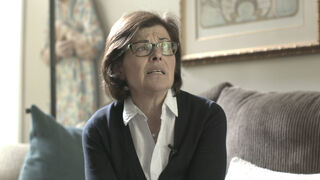Cognitive Behavioral Therapy
Did the NXIVM Cult Actually Help People?
HBO's "The Vow" returns to give NXIVM defenders a voice.
Posted November 6, 2022 Reviewed by Devon Frye
Key points
- Thousands of people went through the motivational programs run by criminal NXIVM organization and many claim they were helped by them.
- One of the major alleged successes of NXIVM is their treatment for Tourette syndrome.
- However, they never conducted any controlled studies or published their results, so it's impossible to judge how effective their treatment was.

After two years, the HBO docuseries "The Vow" about NXIVM, often referred to as a sex cult, has returned for a second season; three of six episodes have aired so far. The first season, which I wrote about at the time, largely followed a small group of NXIVM defectors on their mission to take down the organization and expose their crimes, most notably recruiting women to a secret group where they were blackmailed into being abused, getting branded, and having sex with NXIVM’s leader Keith Raniere. The season ended with the arrests of Raniere and NXIVM’s second-in-command, Nancy Salzman, among others.
The main narrative spine of the second season is Raniere’s ensuing trial. But if that’s all it had to offer, it might feel a little stale or repetitive—after all, Raniere’s high-profile trial concluded over two years ago. Instead, the series goes beyond its first season in a compelling way by delving into the murkiness of NXIVM’s impact on its many devotees and the thousands of people who went through its Executive Success Program. Whereas the first season focused almost exclusively on NXIVUM’s victims and critics, the show's second season gives a voice to its defenders, most prominently Nancy Salzman.
Hearing from these people may provoke conflicting feelings in viewers. On the one hand, it may provoke pity for people who are still deeply in the throes of a harmful, cult-like ideology. On the other hand, it may provoke curiosity about whether NXIVM genuinely helped some people, despite the undeniable pain it inflicted on others.
NXIVM’s Experimental Tourette’s Treatment
As a case in point, much of the season’s third episode centers around NXIVM’s “experimental” treatment for Tourette syndrome—a condition that causes people to make sounds or movements known as tics—with an allegedly unprecedented rate of success at eliminating sufferer’s tics. Salzman points to her success at treating Tourette syndrome using the methods she developed at NXIVM as evidence of the good they did.
The sense of ambivalence viewers might feel watching the latest season of "The Vow" is perhaps best embodied in Isabella Constantino, a woman who underwent intensive therapy at NXIVM to treat her severe Tourette syndrome years ago. Constantino, whose tics are now gone, nevertheless feels betrayed by her time in NXIVM: “It’s true, I stopped ticcing, but I become broken in other ways.”
But did NXIVM do any good? It’s entirely possible that they came up with a novel and effective treatment for Tourette syndrome (though it seems highly unlikely given the group’s well-documented history of lies and manipulation). The unfortunate answer, however, is that we honestly don’t know if what they did worked because they didn’t conduct any controlled studies or publish any of their results. The closest we have is a documentary, "My Tourette’s," produced by a non-scientist about a set of case studies.
There’s a useful analogy here to alternative medicine. It is sometimes said that if alternative medicine were shown to be clinically effective, it would cease to be “alternative” and would just be medicine. The same logic applies here. Despite NXIVM’s obsession with being taken seriously by influential people and mainstream institutions, their penchant for secrecy and refusal to follow the norms of science means that their research was scientifically pretty worthless.
The NXIVM Treatment Approach Probably Wasn’t That Revolutionary
But what exactly did they do? Essentially, they used a modified form of cognitive behavioral therapy. According to VICE, “subjects [were] asked to recall traumatizing moments from their childhood and beyond … Through the session, an unlicensed NXIVM ‘practitioner’ help[ed] the subject deconstruct the flawed ‘associations’ triggering traumatic responses, and build new associations.”
This treatment approach is not dramatically different from the Comprehensive Behavioral Intervention for Tics (CBIT), which consists of teaching patients to become more aware of their tic urges and replacing their tics with different behaviors. CBIT is the most common behavioral treatment for Tourette syndrome and has considerable empirical support. In one systematic review published in 2019 of all randomized controlled trials of treatments of tics that included at least 20 subjects, CBIT came out as the treatment with the strongest effectiveness, based on trials that compared it to basic psychotherapy.
Would NXIVM’s bizarre spin on CBIT fare even better? Maybe, maybe not. Once again, we don’t know because they didn’t conduct any controlled comparisons between the two approaches.
At the end of the second episode, Nancy Salzman reflects on the lack of people coming out to defend NXIVM and exclaims incredulously, “17,000 people got good results. Where are they?” "The Vow" shows us some of them. But it also helps us understand that “getting good results” through NXIVM’s programs is not necessarily evidence of their effectiveness.




